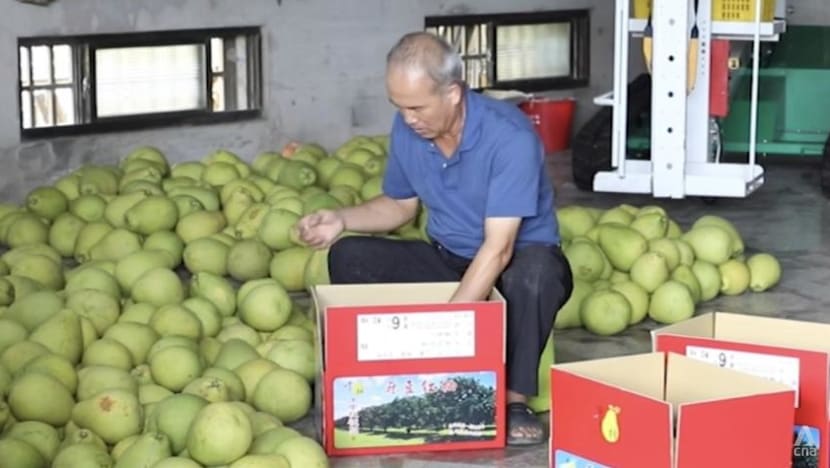Pomelo shampoo and body lotion: Taiwan’s farmers find new ways to cope with China’s import ban
China had announced last year that it would be banning imports of all Taiwanese citrus fruits including pomelos, two kinds of fish, and other packaged food like instant noodles, citing quality concerns.

Pomelo farmer Chen Chun-ren from southern Tainan's Madou district, the heart of pomelo farming on the island.
TAIWAN: With the mid-autumn festival approaching, Taiwanese pomelo farmer Chen Chun-ren has been working day and night to harvest the fruit.
Pomelos are traditionally eaten in Chinese-speaking regions during the mid-autumn festival because they sound like “bless you” in Mandarin.
Mr Chen, 64, hails from Madou district in the southern city of Tainan, the heart of pomelo farming on the island.
Last year, he and the 10,000 other pomelo farmers in Madou faced a sudden and unexpected challenge.
China announced last August that it would be banning imports of all Taiwanese citrus fruits including pomelos, two kinds of fish, and other packaged food like instant noodles, citing quality concerns.
The ban came shortly after then-United States House Speaker Nancy Pelosi’s controversial visit to the island just weeks before the mid-autumn festival in September.
PLUNGE IN POMELO PRICES
It caused pomelo prices to plunge, as it was too late for farmers to find new markets for the seasonal fruit.
In 2021, Taiwan exported more than 7,000 tonnes of pomelos, over 95 per cent of which headed to mainland China and Hong Kong. Madou accounts for some 28 per cent of the island’s annual output for pomelos.
“Some of my friends used to export their products to China. They were very anxious when China cut the order suddenly. All they could do is to find a new market as soon as possible,” said Mr Chen.
One year on, ahead of the mid-autumn festival on Friday (Sep 29), China has yet to relax its ban.
To reduce the impact on farmers, Taiwan’s Council of Agriculture has provided subsidies, while finding new overseas markets.
“We expected to face a huge impact after China’s ban. But instead, it created an opportunity,” said Taiwan's Agriculture and Food Agency director-general Hu Jong-I.
“China is not the only market in the world. Local farmers are selling the pomelos to new overseas markets such as Canada, Japan and the UK. Over 173 tonnes of pomelos have been sent abroad (to countries other than China) so far this year. We have never managed to do that (by this time of the year) before.”

FARMERS FIND SOLUTIONS
Farmers have also sought new solutions.
The Madou Farmer’s Association has developed new pomelo products - from edible dried pomelo peel and jam to body lotions and shampoos - to ensure that the fruit is consumed even during off-season.
“Besides fresh pomelos, processed pomelos are now exported overseas. This means that pomelos can now be sold throughout the year.” said the association’s director-general Sun Tzu-ming.
“The reason we do this, is so that farmers can sell the fresh fruits. While the association will process and promote the more expensive or lower quality fruits. This means that there will always be a market for the pomelos. And that's why we're helping the farmers, which is my goal as well.”
Such moves will ensure that pomelo farmers can continue to enjoy the fruits of their labour even if China does not relax its import ban.














